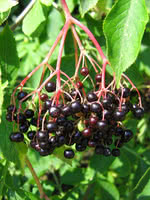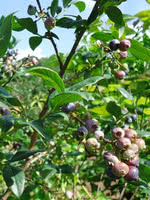Mon-Fri 9am - 5pm Mountain time
Black Elderberry vs Northland Blueberry
Sambucus canadensis
Vaccinium corymbosum Northland
NOT AVAILABLE THIS SEASON - MIGHT RETURN
NOT AVAILABLE THIS SEASON - MIGHT RETURN
Black Elderberry is a deciduous shrub native to eastern North America. You can plant this shrub in moist areas and it will help stabilize your soil. You can also use it on rural properties anywhere you'd use a lilac.
Black Elderberries are considered to be partially self-pollinating. So while they will still produce some berries without cross-pollination, planting with another variety will increase yields. Consider planting with Ranch Elderberry or Bob Gordon Elderberry.
Warning: the seeds, stems, leaves, roots, and uncooked berries of the Black Elderberry are poisonous to humans when eaten in quantity. You should cook the berries to make them safe for human consumption.
Northland Blueberry is the hardiest of the half-high highbush blueberries. It's also the best looking. In fact, it is frequently planted as an ornamental. Northland Blueberry produces large quantities of medium-size berries that taste amazing but are on the softer side, which matters to some people.
You must also prune Northland Blueberry to maintain its health and productivity.
Note: Blueberries require very specific soil conditions. They need well-drained soil with a pH between 4.5 and 5.0. If the starting pH of your soil is between 5.1 and 6.2 you can lower it by adding sulfur. We recommend against planting blueberries in soil with a starting pH greater than 6.2. Please do your own research before buying any blueberry plants.
Black Elderberry Quick Facts
Northland Blueberry Quick Facts
Toxicity: leaves, stems, and uncooked berries are poisonous to humans

